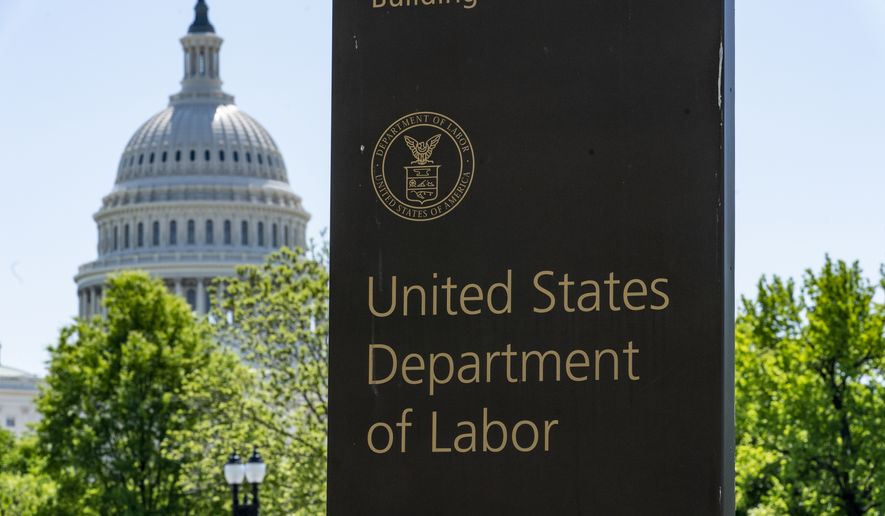The federal government blew at least $163 billion on bogus pandemic unemployment benefit payments and has recaptured less than $1 billion of it, the program’s inspector general told Congress on Thursday.
Labor Department Inspector General Larry D. Turner said the states that doled out the federal money weren’t prepared for the massive infusion of cash in their unemployment systems and relied on outdated networks that fraudsters easily exploited.
The result was that of $872.5 billion in federal unemployment money, at least 18.71% — or about $163 billion — was misspent. Mr. Turner said he expects further data will increase that number.
Some of the bad payments were checks going out too big or too small, but chiefly it was what Mr. Turner called “a perfect storm” for fraud.
“This created a situation where fraudsters had a high-reward target where an individual could make a fraudulent claim with relatively low risk of being caught, at least initially, due to the lack of basic anti-fraud measures,” he said. “As time went on, one fraudster could have been issued several UI debit cards, with tens of thousands of dollars on each card.”
Mr. Turner said his office has received more than 140,000 leads and opened more than 38,000 cases but so far has recovered only $830 million — about 0.5% of the minimum total of bogus payments.
The rest of the money remains in fraudsters’ hands or has been spent.
“We believe it’s going to be somewhat difficult to get that back,” Mr. Turner told the Senate Homeland Security and Governmental Affairs Committee. “So many of the fraudsters have already spent it on high-dollar items.”
He said it will take years to know how much can be recovered.
Sen. Rob Portman, Ohio Republican, said “$830 million is a lot of money. On the other hand, it pales in comparison to $163 billion.”
All told, Congress has approved some $5 trillion as part of coronavirus relief. That is more than the entire federal budget in 2019, the last full year before the pandemic.
Figuring out where much of it ended up is impossible, said Michael E. Horowitz, chair of the Pandemic Response Accountability Committee and inspector general at the Justice Department.
SEE ALSO: Federal officials warn billions stolen from COVID unemployment benefits through fraud
He said data that agencies are reporting is often useless for oversight and in thousands of instances it’s “gibberish.”
“You can’t make heads or tails of what the money’s for,” he said.
Mr. Horowitz shied away from estimating how much of the $5 trillion will be found fraudulent, but he said it would be in the hundreds of billions.
Haywood Talcove, CEO of LexisNexis Risk Solutions’ government group, has estimated that pandemic fraud totals at least a quarter of a trillion dollars, much of that stolen by foreign actors. Recovering money from them is almost impossible.
Fraud ranged beyond the unemployment program. The Small Business Administration’s handling of pandemic loans ranked as another major source of problems.
The federal government’s comptroller general, Gene L. Dodaro, told lawmakers that his agency, the Government Accountability Office, made overtures to the Small Business Administration on how to impose controls over spending. The agency “resisted.”
“SBA didn’t heed any of our recommendations,” he said. “They needed help, but they rebuffed it.”
SBA and unemployment fraud are the bulk of pandemic-related federal criminal prosecutions.
Across all pandemic programs, Mr. Horowitz said, 1,200 indictments or complaints have been filed, 1,000 arrests have been made and nearly 500 convictions have been handed down.
President Biden this month announced a new senior position at the Justice Department dedicated to overseeing pandemic fraud cases, and many U.S. attorneys have formed their own task forces.
Cases include a California recording artist who posted a rap video of himself filing unemployment claims — the very claims the government says were bogus — and Nigerian fraud rings that shifted operations from other scams when it became clear how much money was available and how easy it was to get.
For unemployment, the standard scam was to take someone else’s name and information and submit for benefits under that identity. Some prisoners scoured identities of inmates and fed those to people on the outside. Others bought identities on the darknet for a couple of dollars per name and submitted them en masse. They figured that if one in 10 were approved, they would end up with huge payoffs.
Watchdogs said it’s not just the government programs that suffered.
Deserving applicants got crowded out and had to wait longer for benefits. Some whose names were fraudulently submitted before they applied faced a gantlet.
“It turns out they’re the ones being questioned as if they’re the fraudsters. They’re the ones struggling to get their identities back,” Mr. Horowitz said.
Fraud within the pandemic programs was expected. Congress figured that getting money out the door was more important than scrutiny.
States were shockingly unprepared to deal with the fraud, the watchdogs told Congress.
Despite attempts to force modernization in the past decade, many states had outdated systems with no ability to conduct basic identity checks. They were also understaffed and undertrained, Mr. Turner said.
Sen. Rick Scott, Florida Republican, suggested trying to reclaim money from states with policies that let ineligible people sign up.
Jason S. Miller, deputy budget director at the White House, repeatedly rejected the idea. He said targets should be individuals who applied in violation of the law.
“We should go after the fraudsters first and foremost,” he said.
• Stephen Dinan can be reached at sdinan@washingtontimes.com.




Please read our comment policy before commenting.